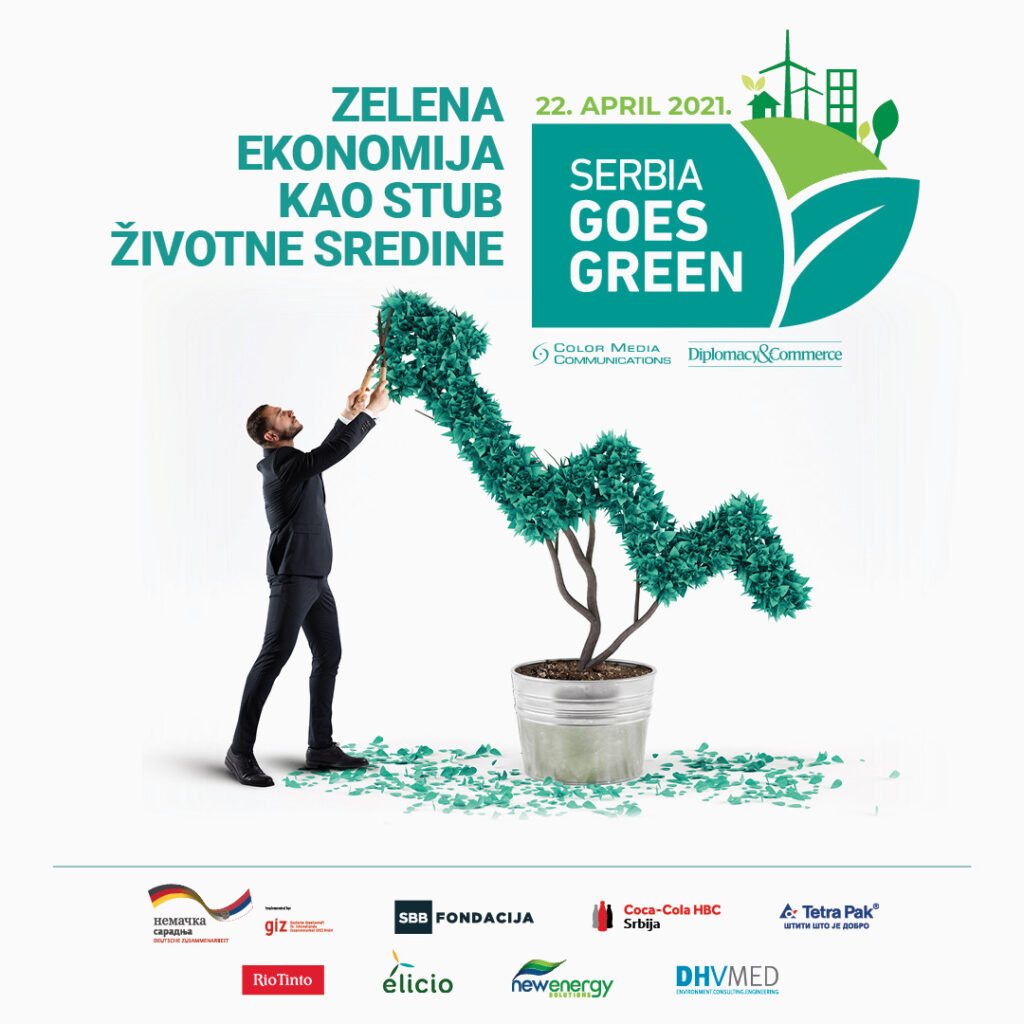Belgrade, 22 April 2021 – On the occasion of Earth Day, Color Media Communications organized an online conference on sustainable development titled Serbia Goes Green – Green Economy as the Pillar of Environmental protection, with the support of German Corporation for International Cooperation (GIZ Serbia) and companies SBB Foundation, Coca Cola HBC, Rio Tinto, Elicio, Tetra Pak, New Energy Solutions and DHVMED Israel.
At the opening of the conference, Deputy PM and Minister of Mining and Energy Zorana Mihajlović stated that she wants Serbia to become a green country.
“Serbia is on the verge of adopting four key basic laws in the field of energy, and the Law on Climate Changes has already been adopted. We are also working on the National Energy and Climate Plan, we are making a new Strategy for the development of energy, which means that there will be no more decisions in the field of energy without us checking how it affects the environment. Also, in 2040, Serbia will be a country that will produce electricity and heat, and over 40% of it will come from renewable energy sources,” said Minister Mihajlović.
At the first panel titled Serbia as a green investment destination – Ecological approach for economic progress, the speakers were Srđan Gavrilović, Commercial Strategy Manager, Rio Sava Exploration, Jovana Lukić, director of the SBB Foundation and CSR director of the United Group, Prof. Dr Đorđe Mitrović sa from the Faculty of Economics in Belgrade, Zoran Jakovljev, Advisor, GIZ Srbija, Goran Matović, Lead Engineer, GEFF Serbia Leasing.
Zoran Jakovljev, Advisor, GIZ Srbija spoke about the new project “Smart system for recycling cans” which is being implemented in Belgrade. “The project includes the testing of a new model based on the principles of circular economy. It is a digital recycling system based on the use of smart devices, primarily a smart can press that is equipped with various sensors. By inserting cans into these smart presses, citizens are collecting points for discounts in Idea markets. Our idea is to expand this project in other cities as well “, Jakovljev said.
Jovana Lukić, director of the SBB Foundation and CSR director of the United Group stated at the first panel: “As a company, we have always had different engagements in the community in which we live and acted responsibly towards the community in which we operate. We are very loud and present in order to point out the need to change the consciousness and habits of individuals, the economy and the state in preserving the environment, to connect with each other, because that is the only way to be a greener country”. She added that in addition to social responsibility projects implemented through the SBB Foundation, SBB develops services that have a direct impact on nature protection, such as the E-invoice that protects forests, and they are also developing internal policies and procedures for participation in environmental improvement.
“We are actively dealing with other aspects of responsible business, such as ESG (Environmental, Social and Corporate Governance). We operate as United Group in 8 countries, we try to learn from each other and apply good practice from other countries in our country and vice versa”, Lukić underlined.
Srđan Gavrilović, Commercial Strategy Manager, said that Rio Tinto recognized climate changes as a scientifically proven reality 20 years ago.
“In 2018, we reached a strategic decision to abandon further coal production. Also, 75% of total electricity comes from renewable sources, and that percentage is continuously increasing. In addition, we have allocated one billion dollars for the period from 2020 to 2024 for projects that are exclusively related to climate change,” Gavrilovć pointed out.
Speakers at the other panel discussion on the topic Renewable Energy Sources in Serbia – Business Environment, Legislation and Development Perspectives were Christophe Bols, Elicio Country Manager Serbia, Aleksandar Popović, Project Manager, GIZ Srbija, Marijan Rančić, Business Development Director of New Energy Solutions and Miloš Kostić, co-owner of the companies MT- KOMEX, Solaris Energy I CEEFOR.
Aleksandar Popović, Project Manager at GIZ Srbija underlined that GIZ supports the new Law on Renewable Energy Sources.
“The new law represents a significant basis for further development of renewable energy sector. This law will also lay the foundations for achieving the goals set within the Agreement with the Energy Community. In addition, introduction of renewable energy sources is one of the most important measures to reduce greenhouse gas emissions, but the new law that was passed is also important for meeting other international obligations, “said Popović.
Marijan Rančić, Business Development Director, New Energy Solutions stated that he first had doubts whether the new Law on Renewable Energy Sources would be good, given the short deadline, but now he believes that the law is really good.
“The law provides a clear picture and a secure investment framework. Serbia has this practice where the primary regulation provides only a framework, guidelines, while the secondary regulations, decrees, acts are used to define the sector itself. This suggests that a key part of the job is ahead of us. Certainly, this law has created an environment for a new investment cycle in renewable energy sources in Serbia,” said Rančić.
Christophe Bols, Elicio Country Manager Serbia said that it’s time for new projects.
“We have started preparations in 2019 for the development of two new projects, we are currently waiting for the urban plan and hope that this decision will arrive soon. Projects related to solar energy and biomass cannot be realized in a short period of time. It is necessary to make adjustments to the network, in the long run there is a space of 3000 to 4000 megawatts. However, consumption will rise, more and more industry is coming to Serbia, so the production of green energy will be needed “, Bols pointed out.
At the third panel The future of Serbian circular economy – Recycling Industry in Serbia, the speakers were Ivan Karić, State Secretary, The Ministry of Environmental Protection of the Republic of Serbia, Tisa Čaušević, Public and Regulatory Affairs Manager at Coca-Cola HBC Serbia, Dragan Rajković, Regional Sustainability Director – Tetra Pak, Prof. Dr Aleksandar Jovović, Faculty of Mechanical Engineering, University of Belgrade, Nenad Ratković, Sales and Purchase Manager, Eco-Recycling.
Ivan Karić, State Secretary at the Ministry of Environmental Protection underlined at the panel that the Ministry sees the Negotiating Position for Chapter 27 as the main strategic document in achieving goals, primarily goals of circular economy.
“Our position in the light of circular economy is one step ahead, before the European Commission adopted a new circular economy package, but nevertheless, we have already started revising five specific implementation plans related to waste management this year, in accordance with the new circular economy package. I would also like to point out that 30 institutions and about 150 different experts participated in the drafting of the Negotiating Position for Chapter 27, and we cooperated with all of them through many working groups “, stated Karić.
Tisa Čaušević, Public and Regulatory Affairs Manager at Coca-Cola HBC Serbia, said that sustainability is the topic they approach with utmost attention, and for many years, their activities have raised the ladder of responsible and sustainable business.
“At this moment, we focus our attention to the development of sustainable packaging, but also provide support to the state in finding the most efficient solutions for the collection and management of packaging waste. We are also very committed to pilot projects with which, and through good practice, we want to check the effects of a potential deposit system. We also know that our country has an important task in the process of joining the EU, and that is the opening of an extremely demanding Chapter 27. As a stable partner of the community in which we operate, we provide all the necessary support to the Government of Serbia so that demanding conditions are met as soon as possible,” Čaušević said.
Dragan Rajković Regional Sustainability Director at Tetra Pa, said at the panel: „ Serbia has a chance to show that a comprehensive deposit system permanently solves the problem of efficient waste collection and subsequent recycling and it has a chance to become a leader in waste management innovations. Tetra Pak is ready to contribute its know-how to the introduction of the necessary regulatory changes. ”
At the last panel, Environmental compliance and regulation in Serbia, where focus was placed on air, contaminated soil, industrial and hazardous waste, the speakers were Daniela Meilmann, Business Development Manager, DHVMED Israel, Siniša Mitrović, Chamber of Commerce and Industry of Serbia, Radovan Đukić, Deputy Mayor of Apatin, Marinko Ukropina, Managing Director SGS Beograd, SGS Adriatica, SGS Slovenia & SGS Bosnia and Herzegovina and Kristina Cvejanov, Business & CSO Consultant, Green Loop Consulting.
Daniela Meilmann Business Development Manager from DHVMED Israel, said that DHVMED is one of the largest companies in that country.
“We have the know-how which, together with engineering solutions, can contribute to Serbia and the Balkans in overcoming environmental challenges. We believe we have a solution and an innovative approach to the air pollution you face today, but also to other environmental problems,” Meilmann underlined.
Izvor: diplomacyandcommerce.rs

